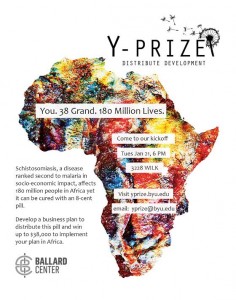BYU students showed their eagerness to “go forth (and) serve” by attending the Y-Prize kick-off event Jan. 21.

Y-Prize is an opportunity for BYU students to serve the Ugandan people without leaving Provo. The Ballard Center for Economic Self-reliance, in partnership with the Social Venture Academy, designed a competition to encourage students to develop and implement a strategic distribution plan to bring a life-saving pill to Uganda.
“The thing that excites me most about this competition is that students are able to come and use their individual skills to bless the lives of thousands of people in Africa,” said Rebecca Loveland, a co-director for Y-Prize.
The kick-off event began by providing some background information about schistosamiasis, a disease that affects over 200 million people worldwide.
Schistosomiasis is a disease caused by parasitic worms. In terms of impact, this disease is second only to malaria as the most devastating parasitic disease. The cure for this disease is an annual dose of Praziquantel, a pill that only costs $.08.
However, effective distribution systems are limited in Uganda, so these BYU are tasked to solve the logistical puzzle of getting the pill to the people. The formal question of the competition is, “How can we get Praziquantel to the people who need it in Uganda, and how can we help their culture accept it?”
Any students can tackle this challenge in groups of two to six people; at least one has to be a full-time BYU student. Once the team is put together, they may start finding a solution to this Praziquantel distribution problem.
The winning team will receive $38,000. This money is to be used to implement the very plan that the students create. The competition isn’t limited to just one winner; if a team has strong, solid ideas, BYU wants to fund them.
Nicko Fusso, a program director for a non-profit organization that works with this disease, skyped in with tips for students in the competition. He encouraged them to keep their distribution costs down, compile their own data and think big, but realistically.
For more information, students can visit www.yprize.byu.edu or email .




